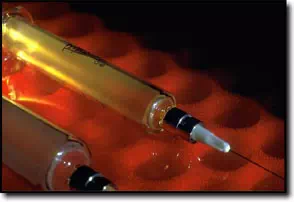 Kansas
Medical
Services Waste
Managing Medical Services
Waste
OSHA Regulations
Statutes, Regulations and Guidelines
Contacts
More Information
Definition of Medical Services Waste
Medical services wastes
are those solid waste
materials which are potentially capable of causing disease or injury
and which are generated in connection with human or animal care through
inpatient and outpatient services. Medical services waste shall not include
any solid waste that has been classified as a hazardous waste, or that
is radioactive treatment material.
Managing Medical Services
Waste
Segregation
All medical services waste
shall be segregated from other solid wastes at the point of origin.
Storage
All medical services waste
shall be stored in a manner and in a container that will prevent the transmission
of disease or the causing of injury. Hypodermic needles and syringes,
scalpel blades, suture needles, or other sharp objects shall be stored
only in a rigid, puncture-resistant container that has been closed to
prevent the escape of any material, including liquids or aerosols. All
reusable containers used to store infectious waste shall be cleaned and
disinfected before each use.
Containment/Labeling
The medical services waste
must be placed in containers that are closable, constructed to contain
all contents and prevent leakage of fluids, and closed prior to removal.
The containers must be labeled or color-coded in accordance with the
federal Bloodborne
Pathogens requirements. The labels must have the BIOHAZARD legend. Red bags or red containers may be substituted for
labels.
Collection
Medical services wastes
shall be collected at least daily from the point of origin for transport
to a storage or disposal area or a processing facility. Personnel shall
take precautions to prevent accidental contact with the waste during
transfer.
Transportation
All medical services wastes
transported off-site shall be transported in a manner that will prevent
the spread of disease or the causing of injury to persons.
The waste transporter or
disposal firm shall be notified of the types of waste.
Containers of medical services
waste transported off-site shall be labeled or color-coded in accordance
with the federal Bloodborne
Pathogens requirements.
Processing
In all processing of medical
services waste, dispersal of aerosols and liquids
shall be prevented through
the use of proper coverings, seals, and ventilation. Personnel shall
be protected against contact with the waste through the use of protective
clothing and equipment. Medical services waste that has been processed
may be combined with other solid waste. Where feasible, all medical services
wastes shall be processed before transportation off-site by using either
of the following methods:
- Sterilizing infectious wastes by autoclaving or
chemical treatment, to destroy the disease/transmission potential;
or
- Grinding, melting, or pulverizing sharp objects
to destroy their injury producing potential.
Disposal
If the potential to cause
disease or injury is removed, then the waste can be mixed with general
solid waste and transported to a Municipal Solid Waste Landfill (MSWLF).
If the medical waste is not processed:
- The facility may obtain a Special Waste Disposal
Authorization and transport the medical waste separately to a MSWLF;
or
- The facility may contract with a medical waste company
for transportation and disposal of the medical waste to a MSWLF (with
SWDA) or to a permitted medical waste processing facility.
Medical services waste
shall be disposed of in a manner that minimizes the risk to health, safety,
or the environment. The following shall be considered acceptable disposal
methods:
- Discharge of liquids to a sanitary sewer that is
connected to a secondary sewage treatment plant;
- Incineration of combustible solids, followed by
disposal of the ash in a sanitary landfill;
- Disposal in a properly permitted hazardous waste
disposal facility; or
- Disposal in an approved sanitary landfill
OSHA Regulations: VetCA
OSHA State Page
In addition to the state medical waste environmental
regulations there are some Occupational Safety and Health Administration
(OSHA) rules that apply to medical/infectious waste. Kansas is
one of 26 states covered entirely by the federal OSHA program. This
program is operated by the Occupational
Safety and Health Administration. OSHA rules (Occupational
Exposure to Bloodborne Pathogens Standards) impact various aspects of
medical/infectious waste, including management of sharps, requirements
for containers that hold or store medical/infectious waste, labeling
of medical/infectious waste bags/containers, and employee training. These
requirements can be found in the VetCA section entitled OSHA Standards for Regulated Waste.
Statutes, Regulations and Guidelines
Kansas
Administrative Regulations, Article 29 - Solid Waste Management
Contacts
Kansas Department of Health
and Environment, Bureau of Waste Management
Kansas Department
of Health and Environment, Bureau of Air and Radiation
More Information
Kansas
Medical Services Waste Guidance Document
|

